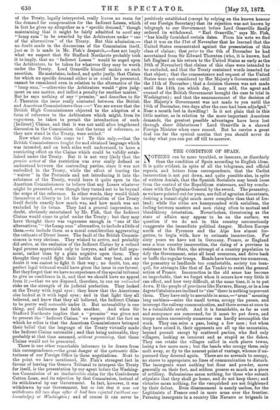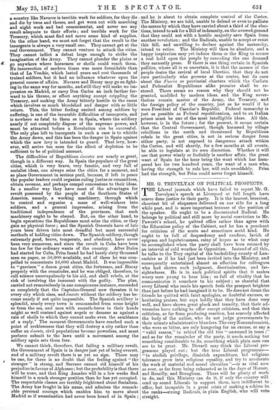THE CONDITION OF SPAIN.
NOTHING can be more troubled, or insecure, or disorderly than the condition of Spain according to English ideas. It is quite evident, in spite of all the telegrams, and official reports, and letters from correspondents, that the Carlist insurrection is not put down, and quite possible also, in spite of written denials, that the Spanish Socialists may break loose from the control of the Republican statesmen, and try conclu- sions with the Captains-General by the sword. The peasantry, as we have pointed out for years, are full of agrarian discontents, desiring a tenant-right much more complete than that of Ire- land ; while the cities are honeycombed with socialism, the feeling between masters and men rising often to mutual and bloodthirsty detestation. Nevertheless, threatening as the state of affairs may appear to be on the surface, we question if we do not in this country unconsciously exaggerate the immediate political danger. Modern Europe north of the Pyrenees and the Alps has almost for- gotten, to begin with, how to estimate insurrection. For sixty years we have not in Germany, France, or England seen a true country insurrection, the rising of a province in resistance to the State, the attempt of a country population to defy the Government, seize all local resources, and drive back or baffle the regular troops. Roads have become too numerous, the peasantry or landlords too comfortable, society too tran- quil, for attempts like that of La Vendee to resist the general action of France. Insurrection in the old sense has become so improbable, that we forget when it occurs how very little it can effect, and how very difficult, at the same time, it is to put down. If the people of provinces like Navarre, Biscay, or in a less degree Catalonia are inclined to "rise" there is nothing to prevent them. They have only to assemble in arms,—" arms " meaning long carbines—seize the small towns, occupy the passes, and intercept the railway communication, and there seems at once to be a formidable revolt. And it is formidable, as far as cost and annoyance are concerned, for it must be put down, and troops unless excessively numerous can hardly accomplish the work. They can seize a pass, losing a few men ; but when they have seized it, their opponents are all up the mountains, beyond pursuit except by scattered parties, who find only villagers, looking as innocent and as stupid as the fishes. They can retake the villages called in such places towns, losing a few more men ; but the bands who occupy them only melt away, or fly to the nearest point of vantage, whence if un- pursued they descend again. There are no arsenals to occupy, no stores to appropriate, no lines of communication to disturb. The insurgents want nothing bat flour and powder, move generally on their feet, and seldom possess so much as a piece of artillery. Submissions mean nothing, for those who submit stipulate that they shall go home, and do not keep there; and victories mean nothing, for the vanquished are not frightened by their defeat. Even disarmament is nearly useless, for the Legitimists of France send in more arms over the frontier. Pursuing insurgents in a country like Navarre or brigands in
a eountry like Navarre is terrible work for soldiers, for they die and die by twos and threes, and get worn out with marching and night work and bad commissariat, and never see any result adequate to their efforts ; and terrible work for the Treasury, which must find and move some kind of supplies. On the other hand, we must not forget tbat the result to the insurgents is always a very small one. They cannot get at the real Government. They cannot venture to attack the cities. They cannot inflict a defeat large enough to strike the imagination of the Army. They cannot plunder the plains or go anywhere where horsemen or shells could reach them. No insurrection of modern times was more formidable than that of La Vendee, which lasted years and cost thousands of trained soldiers, but it had no influence whatever upon the general course of affairs. Navarre and Biscay may go on fight- ing in the same way for months, and still they will make no im- pression on Madrid, or carry Don Carlos an inch farther for- ward to his throne, or effect anything except crippling the Treasury, and making the Army bitterly hostile to the cause which involves so much bloodshed and danger with so little return. This, the bitter feeling excited among soldiers by suffering, is one of the incurable difficulties of insurgents, and is nowhere so fatal to them as in Spain, where the soldiery nearly if not completely dispose of the supreme power, and must be attracted before a Revolution can be successful. The only plan left to insurgents in such a case is to whittle the Army down, and this has been the danger in Spain against which the new levy is intended to guard. That levy, how- ever, will arrive too soon for the effect of depletion to be sufficient to be of political account.
The difficulties of Republican enzeutes are nearly as great, though in a different way. In Spain the populace of the great cities, which is very brave, very fanatic, and very full of socialist ideas, can always seize the cities for a moment, and so place Government in serious peril, because, if left in peace the popular leaders could organise ruling juntas or committees, obtain revenue, and perhaps compel concessions to their ideas. In a smaller way they have most of the advantages for revolt possessed by the people of the Southern States of America, namely, a working machinery, through which to control and organise a mass of well-wishers into soldiers, and a general impression, arising from the traditional independence of the provinces, that such machinery ought to be obeyed. But, on the other hand, to begin operations the Republicans must seize the cities, or they gain no physical force ; and the Spanish Generals have of late years been driven into most dreadful but most successful methods of holding cities down. The Spanish soldiery, though extremely good, brave, temperate, and obedient, have never been very numerous, and since the revolt in Cuba have been too few for the erdinary wants of the country. After Dulce had started for Cuba, Prim found he had barely sixty thousand men on paper, or 50,000 available, and of these he was com- pelled to concentrate 16,000 about Madrid. It was impossible to "garrison" a dozen great cities, the fortresses, and Biscay properly with the remainder, and he was obliged, therefore, to call science unscrupulously to his aid, and shell rebels, at the risk of involving the innocent with the guilty. The plan, carried out remorselessly in one conspicuous instance, succeeded so completely that the Captains-General now threaten it to every city which rises, and eruzeute without the soldiery has be- come nearly if not quite impossible. The Spanish artillery is splendid, nearly every town is commanded from some height or from the sea, and men with smooth-bores in their hands might as well contend against angels or demons as against a rain of shells to which they cannot make even the semblance of a reply. The moment Governments have reached such a point of recklessness that they will destroy a city rather than suffer an enzeute, civil populations become powerless, and must perforce submit to the laws until a movement among the soldiery again sets them free.
We cannot think, therefore, that failing a military revolt, the Government of Spain is in danger just yet of being overset, and of a military revolt there is as yet no sign. There may be one, for there is no doubt that the feeling against "the stranger" is strong, and Serrano cannot rid himself of his prejudice in favour of Alphonso ; but the probability is that there will be none, and that King Amadeo will in a few weeks find himself in a much stronger position than he has yet occupied. The respectable classes are terribly frightened about Socialism. The Army has fought in his name, and admires the remark- able personal courage which enables him to move about Madrid as if assassination had never been heard of in Spain ;
and he is about to obtain complete control of the Cortes. The Ministry, we are told, unable to defend or even- to palliate the means by which they have carried about a third of the elec- tions, intend to ask for a Bill of indemnity, on the avowed ground that they could not with a hostile majority save Spain from another revolution; and the Radicals, unable to accept or resist this bill, and unwilling to declare against the monarchy, intend to retire. The Ministry will then be absolute, and a happy inspiration may yet induce them or the King to secure a real hold upon the people by conceding the one demand they earnestly press. If there is one thing certain in Spanish politics, where all is so uncertain, it is that the masses of the people desire the revival of local liberties, that they do not care particularly who governs at the centre, but do care about the Fueros or provincial charters which the Carnets and Federalist Republicans alike promise shall be re- stored. There seems no reason why they should not be granted, modified by modern ideas, and the King never- theless remain master of the Army, the Treasury, and the foreign policy of the country, just as he would if he were President of Castelar's Republic. Federal monarchy is. just as possible as Federal republicanism, and to an Italian prince mast be one of the most intelligible ideas. .All this, however, is in the future ; for the present, it seems certain that the Central Government, though harassed by village rebellions in the north and threatened by Republican rebels in the great cities, is not in serious danger from either party, is not exposed to dangerous attack within the Cortes, and will shortly, for a few months at all events, be able to legislate at its own discretion. Whether it will use that power wisely or foolishly is another affair, the great want of Spain for the hour being the want which has ham- pered her for two hundred years, the want of a man who, having the strength to rule her, will rule unselfishly. Prim had the strength, but Prim could never forget himself.



































 Previous page
Previous page